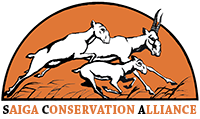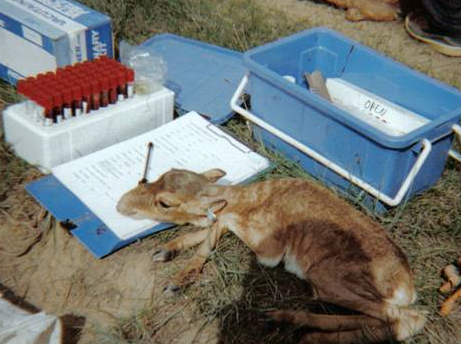Elucidating climatic drivers of mass mortality in the endangered Saiga antelope.
In May 2015, catastrophic mortality affected calving aggregations of saigas in their core range, wiping out half the global population in a few weeks. The cause remains uncertain, with infectious disease involved but probably just one aspect of a more complex underlying causation. Climate could be involved in several different ways. Primary production on the steppe is highly sensitive to climate, and asynchrony between forage availability and saiga presence could have negative effects on body condition and ability to cope with disease. Altered migration patterns in response to climate and other factors could also bring saigas into new areas and expose them to unfamiliar vegetation, leading to metabolic disruption or toxicosis, and to contact with livestock and other reservoirs of infectious disease. Changes in climate, especially extreme weather events during calving, could place saigas under physiological and energetic stress and exacerbate the emergence and impacts of pathogens
This project will examine the role of climate change in the aetiology of mass mortality in saigas, as part of a larger NERC-funded project that aims to enhance population viability by addressing biotic and abiotic threats. Initially, the student will utilise data collected during 2015-16 on saiga migration patterns and climatic factors in relation to die-off sites, to define covariates and address hypotheses on causation. Outcomes will define the next phase, which will build a predictive framework of the effects of climate change on saiga vulnerability to disease. Possible areas of focus are trophic asynchrony, effects of climatic instability on physiological state, and infectious disease transmission prior to calving. Whichever mechanisms are chosen, models will include appropriate climatic inputs, in order to explore potential effects of future climate change. The models will also be used to refine hypotheses and choose critical data needs, focusing fieldwork efficiently.
There will be opportunities to join field visits to the saiga range in Kazakhstan as part of the international scientific team investigating the mortality events, for data collection in support of model calibration and validation.
Outcomes will be an improved understanding of the potential impacts of climate change on saiga population health, and assessments of the likelihood of future mortality events and possible mitigation measures
Main supervisor: Dr Eric Morgan (University of Bristol)
Co-supervisor: Dr Christos Ioannou (University of Bristol), Dr Colin Torney (University of Exeter), Prof E.J. Milner-Gulland (University of Oxford (collaborator) ), Prof Richard Kock ( Royal Veterinary College (collaborator) ), Dr Navinder Singh ( Swedish University of Agricultural Sciences (collaborator) )
Project enquiries – Email: eric.morgan@bristol.ac.uk Contact number: +44 (0) +447982260332
Details of how to apply here: http://nercgw4plus.ac.uk/phd-projects/2016-17-projects/living-world/

